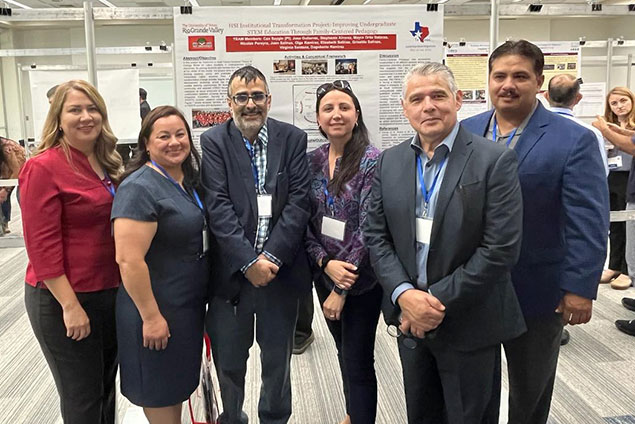Contact:
Know Us
Institutional Transformation Project

This project proposes to evaluate and implement a novel Family-Centered Theory of Change Model for Latinx Students in undergraduate STEM disciplines. By placing students and families from the community at the center of this model, the proposed project aims to dismantle deficit thinking systems, policy, and practices that continue to marginalize Latinx students from STEM fields. The transformative change process begins with a 3-day professional development workshop where the Family-Centered model creates learning opportunities for students, families from the community, and UTRGV faculty, to engage in pláticas (dialogue) as equal producers of knowledge.
In these workshops, participants learn about their historical realities, culturally relevant pedagogy, and the transformative Family-Centered model for STEM education. The interdisciplinary team of Co-PIs and Senior Personnel will revise the existing Community-Engaged Scholarship & Learning, CESL 1101 seminar course into an introductory Mexican American Studies (MAS) for STEM students as they make their transition from high school to college. Utilizing curricula, pedagogies and learning frameworks that are typically used in MAS courses, this course will address diversity, equity, and inclusion (DEI) through the multidimensional intersectionalities framework for multiple social identities, domains of power, and historicity.
Existing STEM courses in mathematics, chemistry and physics that are required for the General Education core will also be revised to include a Family-Centered class project that is culturally relevant and addresses DEI in STEM disciplines paving the way towards higher student learning, persistence and degree attainment. Using a quasi-experimental design with stratified random sampling and repeated measures of pre-, mid-, and post-test performance, we will determine positive changes in sense of belonging and institutional integration, grades, and retention and graduation rates in STEM fields among participating cohorts, accounting for possible multiple treatments in comparison to their respective control groups. Results of this study will be used as a basis for institutional transformation through the implementation of new curricula, pedagogies, and faculty development and evaluation processes.
An advisory board will evaluate the Family-Centered Model by analyzing the change process in students, families from the community, and UTRGV faculty as well as changes in institutional practices and policy that are sustainable and transformative, and reflect an increase in the “servingness” of this HSI and facilitate their implementation at UTRGV.